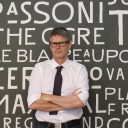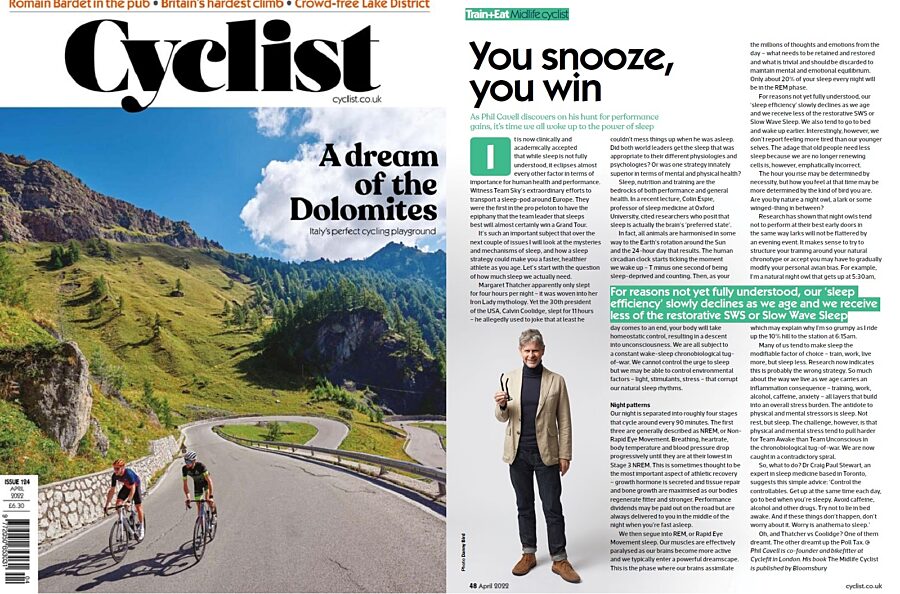"Control the controllables .... and if these things don’t happen, don’t worry about it. Worry is anathema to sleep.’"
"Performance dividends may be paid out on the road but are always delivered to you in the middle of the night when you’re fast asleep."
You snooze, You Win!
It is now clinically and academically accepted that while sleep is not fully understood, it eclipses almost
every other factor in terms of importance for human health and performance. Witness Team Sky’s extraordinary efforts to transport a sleep-pod around Europe. They were the first in the pro peloton to have the epiphany that the team leader that sleeps best will almost certainly win a Grand Tour.
Sleep is such an important subject that over the next couple of issues I will look at the mysteries and mechanisms of sleep, and how a sleep strategy could make you a faster, healthier athlete as you age.
Thatcher v's Coolidge
Let’s start with the question of how much sleep we actually need. Margaret Thatcher apparently only slept for four hours per night – it was woven into her Iron Lady mythology. Yet the 30th president of the USA, Calvin Coolidge, slept for 11 hours – he allegedly used to joke that at least he couldn’t mess things up when he was asleep.
Did both world leaders get the sleep that was appropriate to their different physiologies and psychologies? Or was one strategy innately superior in terms of mental and physical health?
Sleep, nutrition and training are the bedrocks of both performance and general health. In a recent lecture, Colin Espie, professor of sleep medicine at Oxford University, cited researchers who posit that sleep is actually the brain’s ‘preferred state’. In fact, all animals are harmonised in some way to the Earth’s rotation around the Sun and the 24-hour day that results.
"all animals are harmonised in some way to the Earth’s rotation around the sun and the 24-hour day that results"
Nature's Timepiece
The human circadian clock starts ticking the moment
we wake up – T minus one second of being sleep-deprived and counting. Then, as your day comes to an end, your body will take homeostatic control, resulting in a descent into unconsciousness. We are all subject to a constant wake-sleep chronobiological tug-of-war. We cannot control the urge to sleep but we may be able to control environmental factors – light, stimulants, stress – that corrupt our natural sleep rhythms.
Night Patterns
Our night is separated into roughly four stages that cycle around every 90 minutes. The first three are generally described as NREM, or Non-Rapid Eye Movement. Breathing, heartrate, body temperature and blood pressure drop progressively until they are at their lowest in Stage 3 NREM. This is sometimes thought to be the most important aspect of athletic recovery – growth hormone is secreted and tissue repair and bone growth are maximised as our bodies regenerate fitter and stronger. Performance dividends may be paid out on the road but are always delivered to you in the middle of the night when you’re fast asleep.
Into REM
We then segue into REM, or Rapid Eye Movement sleep. Our muscles are effectively semi-paralysed as our brains become more active and we typically enter a powerful dreamscape. This is the phase where our brains assimilate the millions of thoughts and emotions from the day – what needs to be retained and restored
and what is trivial and should be discarded to maintain mental and emotional equilibrium. Only about 20% of your sleep every night will
be in the REM phase.
"It makes sense to try to structure your training around your natural chronotype"
Are you and Owl or a Lark? What's Your Chronotype?
For reasons not yet fully understood, our ‘sleep efficiency’ slowly declines as we age and we receive less of the restorative SWS or Slow Wave Sleep. We also tend to go to bed and wake up earlier. Interestingly, however, we don’t report feeling more tired than our younger selves. The adage that old people need less sleep because we are no longer renewing cells is, however, emphatically incorrect.
The hour you rise may be determined by necessity, but how you feel at that time may be more determined by the kind of bird you are. Are you by nature a night owl, a lark or some winged-thing in between?
Research has shown that night owls tend not to perform at their best early doors in the same way larks will not be flattered by an evening event. It makes sense to try to structure your training around your natural chronotype or accept you may have to gradually modify your personal avian bias. For example, I’m a natural night owl that gets up at 5:30am, which may explain why I’m so grumpy as I ride up the 10% hill to the station at 6:15am.
"The antidote to physical and mental stressors is sleep. Not rest, but sleep."
Control The Controllables
Many of us tend to make sleep the modifiable factor of choice – train, work, live more, but sleep less. Research now indicates this is probably the wrong strategy. So much about the way we live as we age carries an inflammation consequence – training, work, alcohol, caffeine, anxiety – all layers that build into an overall stress burden. The antidote to physical and mental stressors is sleep. Not rest, but sleep. The challenge, however, is that physical and mental stress tend to pull harder for Team Awake than Team Unconscious in the chronobiological tug-of-war. We are now caught in a contradictory spiral. So, what to do? Dr Craig Paul Stewart, an expert in sleep medicine based in Toronto, suggests this simple advice:
‘Control the controllables. Get up at the same time each day, go to bed when you’re sleepy. Avoid caffeine, alcohol and other drugs. Try not to lie in bed awake. And if these things don’t happen, don’t worry about it. Worry is anathema to sleep.’
Oh, and Thatcher vs Coolidge? One of them dreamt. The other dreamt up the Poll Tax.
Phil Cavell is co-founder and bikefitter at Cyclefit in London. His book The Midlife Cyclist is published by Bloomsbury
This Column was first published in Cyclist Magazine - April 2022 and is re-printed here with their kind permission.
"Thatcher vs Coolidge? One of them dreamt. The other dreamt up the Poll Tax."


